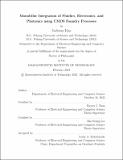Monolithic Integration of Fluidics, Electronics, and Photonics using CMOS Foundry Processes
Author(s)
Kim, Jaehwan
DownloadThesis PDF (73.99Mb)
Advisor
Ram, Rajeev J.
Lee, Hae-Seung
Terms of use
Metadata
Show full item recordAbstract
In the past decade, the fabrication capabilities of CMOS (complementary metal-oxide-semiconductor) foundries have been successfully applied to next-generation sequencing systems to simultaneously lower the cost, miniaturize the footprint, and improve the throughput of the instrument. By utilizing CMOS foundries, designers are given access to patterns with nanometer precision, a suite of readout and data interface circuit libraries, and most importantly the capability to mass-produce their designs. The demonstrations so far have mainly focused on utilizing the sensing capabilities of CMOS, either electrochemical sensing by ion-sensitive field effect transistors or fluorescence detection by an CMOS photodiode array. Moreover, nanofluidic structures within the patterning precision of modern CMOS foundries have functions useful for molecular sensing, such as concentration, separation, or fluorescent signal enhancement by volume confinement. In this thesis, we leverage the precision and scalability of CMOS to fabricate nanofluidic devices alongside photodetectors and readout circuits, utilizing a XeF2 sacrificial etch process from CMOS MEMS fabrication. A packaging approach using wirebonding and low-cost thermoplastic microfluidics is developed for gaining fluidic and electrical access to the CMOS nanofluidic chip. Low-noise and single photon sensitive photodetectors are presented as a means for optical detection of fluorophores. Lastly, capitalizing on this monolithic integration capability, co-design of an integrated nanopore with readout amplifier circuit is performed using multiphysics and circuit simulation tools. With these results, this thesis aims to lay the groundwork for designing and fabricating low-cost, miniaturized, and high performance biomolecule sensing systems.
Date issued
2023-02Department
Massachusetts Institute of Technology. Department of Electrical Engineering and Computer SciencePublisher
Massachusetts Institute of Technology